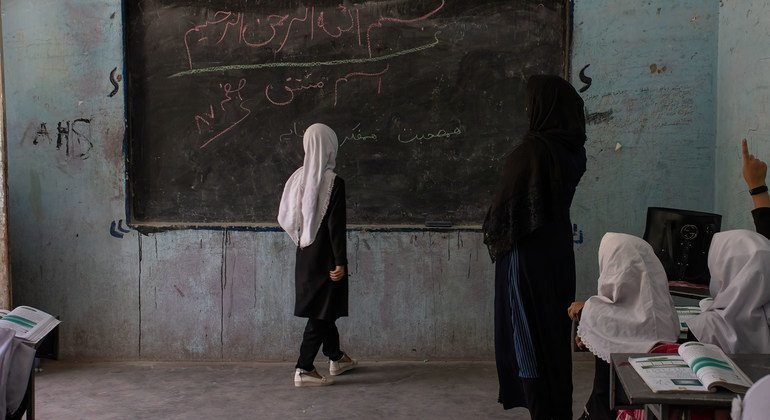Since its takeover, the acting Afghan government imposed restricting policies on women and girls, despite initially promising a more open rule.
In the lead-up to the UN-convened meeting of Special Envoys on Afghanistan unfolding in Qatar on Sunday and Monday, Amnesty International’s senior director called for collective action to safeguard the rights of all Afghans, with a particular emphasis on the rights of women and girls.
“The upcoming Doha meeting is a significant opportunity for a unified and concerted action to protect the rights of all Afghan people, particularly the rights of women and girls. The culture of impunity that enables the Taliban’s ongoing grave human rights violations needs to be addressed urgently,” Deprose Muchena said.
The upcoming two-day meeting is the second to take place in Qatar in less than a year, though no Taliban officials were invited at the time. The agenda will primarily focus on international engagement with the current Taliban-led administration.
Muchena went on to address the Taliban’s disregard for international law, citing severe restrictions.
“The Taliban as the de facto authorities in Afghanistan have shown a complete disregard of the country’s obligations under international law having severely restricted the rights to freedom of expression, peaceful assembly and association, and access to justice in the country,” he said.
He further condemned the Taliban’s escalating discriminatory measures against women and girls, expressing concern over the apparent aim to erase them from public life.
“The Taliban’s discriminatory restrictions on the rights of women and girls, with the apparent aim of completely erasing them from public arenas, has also intensified in the recent months.”
“The international community cannot continue to take a ‘business as usual’ approach vis-a-vis the human rights situation in Afghanistan,” Muchena noted.
“In Doha, the UN Secretary-General, senior UN officials, and all Special Envoys attending the meeting from the region and beyond should insist that the Taliban immediately reverse all restrictions curtailing the rights of women and girls and release all those arbitrarily arrested and unlawfully detained.”
Amnesty International, along with nine other organisations, penned a letter to the UN Secretary-General António Guterres on February 7, urging him to ensure the active participation of Afghan civil society, including women human rights defenders, in the Doha meeting, with a specific focus on making women’s rights a central theme in all discussions.
Afghanistan under the Taliban
Since its takeover, the acting Afghan government imposed restricting policies on women and girls, despite initially promising a more open rule when they assumed power.
Females have since been unable to work or receive education, sparking major concern among the international community and rights organisations.
The upcoming meeting also follows the UN Security Council’s resolution last December requesting the appointment of a special envoy for Afghanistan.
Acting Afghan Foreign Minister Amir Khan Muttaqi said on Wednesday that the Taliban would only attend the meeting in Doha if recognized as Afghanistan’s official representatives.
Qatar, which has served as a diplomatic bridge between the United States and the Taliban over the past decade, hosted a rare direct meeting between the U.S. and Taliban in July 2023, where the former expressed its openness to technical dialogue with the acting Afghan government.
Qatar had paved the way for dialogue when it first opened the Taliban’s office on its lands in 2013 at the request of the U.S.
When the Taliban took over Kabul, Doha played a pivotal role by evacuating more than 100,000 Afghans and foreigners from the country. The mass evacuations have been described as history’s largest airlift of people.
Aside from hosting meetings between the Taliban and the west, Qatar, among other Muslim countries, has repeatedly expressed concern over the interim government’s decisions regarding women and girls.
In January 2023, Qatar’s current prime minister Sheikh Mohammed bin Abdulrahman Al Thani said he spoke to the Taliban to understand the rationale behind the restrictive policies towards Afghan women and girls.
“It’s more and more provoking and making the situation much worse for them and for the Afghan people; we’ve been trying to reach out recently after these decisions [were taken]. We’ve [also] been trying through other means jointly with other Muslim countries to talk to them,” Sheikh Mohammed said at the time.
The Taliban have tightened restrictions on the daily lives of all females over the past two years under a governance approach reminiscent of their former rule between the 1990s and 2001.
In March 2022, they decided to ban girls from attending school on the day the institutions reopened.
Afghanistan’s humanitarian situation has deteriorated due to decades of conflict.
A Human Rights Watch report on Wednesday detailed the multiple crises facing Afghanistan.
More than half of Afghanistan’s 42.2 million population will need humanitarian assistance this year, according to a UN estimate.
“The loss of foreign development aid and Taliban rights violations have caused a catastrophic health crisis in Afghanistan that is disproportionately harming women and girls,” Fereshta Abbasi, Afghanistan researcher at HRW, said.
HRW urged the UN to press the Taliban in the upcoming Doha meeting to lift all restrictions in place.
“The special envoys should also address structural problems that have undermined Afghanistan’s economic stability, including those affecting water management, electrical supply, and the banking system,” HRW added.
